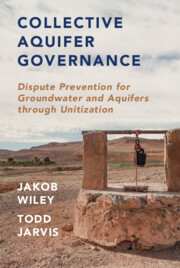Book contents
- Collective Aquifer Governance
- Collective Aquifer Governance
- Copyright page
- Contents
- Figures
- Tables
- Acknowledgments
- Abbreviations
- 1 Introduction
- 2 Overview of the History of Collective Action on Subsurface Resources
- 3 Governance of Groundwater and Aquifers
- 4 Unitization and Collective Aquifer Governance Agreements
- 5 Determination and Redetermination
- 6 The Role of the Expert
- 7 The Next Transresource
- 8 Pore Spaces
- 9 Application to an Aquifer System
- 10 Getting Around Agreeing to Disagree
- 11 Serious Gaming and Unitization
- 12 Conclusions and Recommendations for Future Research
- Appendix Model Collective Aquifer Governance Agreement
- Glossary
- Bibliography
- Index
1 - Introduction
Published online by Cambridge University Press: 20 January 2022
- Collective Aquifer Governance
- Collective Aquifer Governance
- Copyright page
- Contents
- Figures
- Tables
- Acknowledgments
- Abbreviations
- 1 Introduction
- 2 Overview of the History of Collective Action on Subsurface Resources
- 3 Governance of Groundwater and Aquifers
- 4 Unitization and Collective Aquifer Governance Agreements
- 5 Determination and Redetermination
- 6 The Role of the Expert
- 7 The Next Transresource
- 8 Pore Spaces
- 9 Application to an Aquifer System
- 10 Getting Around Agreeing to Disagree
- 11 Serious Gaming and Unitization
- 12 Conclusions and Recommendations for Future Research
- Appendix Model Collective Aquifer Governance Agreement
- Glossary
- Bibliography
- Index
Summary
Groundwater extraction has emerged as a major concern at a global scale. The race to the bottom refers to the practice of drilling deeper to reach ever-deepening water tables. Much attention is given to the threat of reduced access to groundwater, but less attention is given to the irreparable damage to the aquifer due to excessive development. There are several international agreements regarding aquifers, but none refer to storage volumes available in the aquifer. But the potential storage available in aquifer systems could have great value in the future. Unitization explicitly includes governance of storage spaces. By design, unitization seeks to conserve collectively held resources. Elinor Ostrom’s work on common pool resources sought similar outcomes and has similar theoretical foundations. Many of the same policies adopted or proposed for groundwater have similar allegories in the history of oil and gas regulation. These regulations proved ineffective for oil and gas, and unitization closed the policy gap. Because of these similarities, the issues that the oil and gas industry resolved historically with unitization agreements could also address the issues facing today’s aquifers.
Keywords
- Type
- Chapter
- Information
- Collective Aquifer GovernanceDispute Prevention for Groundwater and Aquifers through Unitization, pp. 1 - 14Publisher: Cambridge University PressPrint publication year: 2022



